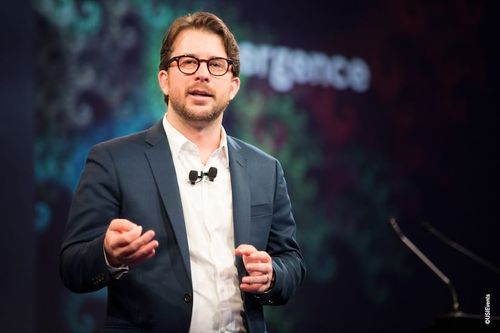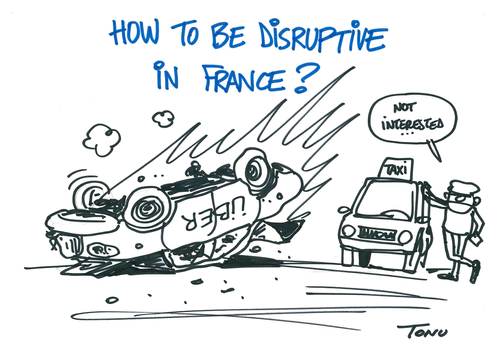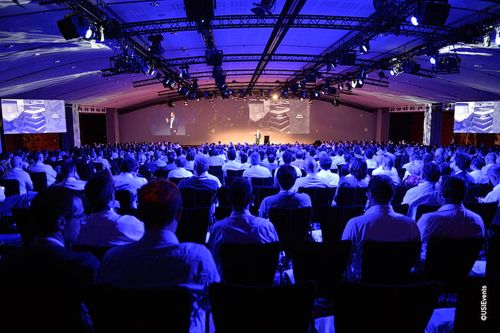Interview d’Aaron Dignan : "The bar for success is whether or not you’re creating value for customers"
Qui de mieux qu’Aaron Dignan, pépite new-yorkaise du conseil en stratégie digitale et keynote USI 2015, pour évoquer l’entreprise de demain ?
Conseils, vision, tendances… L'auteur décrypte ici la profonde transformation technique et sociétale dont nous sommes acteurs et témoins. Si le digital est une promesse d’avenir, seuls les mieux armés sauront tirer leur épingle du jeu.
We’re experiencing a very complex business environnement. Big companies can decline quicker than ever, small onces can florish in a few years. Are we ready for this?
It is definitely difficult for big companies to keep up the pace. There are going to be some casualties and consequences for those who don’t learn to speed up.
But I don’t think it’s that much easier for start-ups, especially those that are scaling rapidly. They hire hundreds or thousands of people in the same year, and don’t know how to organize them. They quickly become bureaucratic and sort of “fall out of love” with their own culture. Many of them end up crashing and burning.
Both big and small companies are facing the same challenges, even though they have different symptoms. The market will suffer more casualties than usual. But the companies that will figure the problems out - and get ready - will do remarkably well.
Doing business isn’t simply about profit anymore. What would be your definition of “doing business”? How should it be understood?
The bar for success is whether or not you’re creating value for customers, for employees, and for the community.
If you can simply say yes to all of that - whether that value is profit, joy, innovation, etc. - I think you can say that you’re “doing business”. And that you’re doing it well in the 21st century.
Large companies are mainly built on silo systems and complex processes that tend to slow down any action or decision. What are the new values these companies should promote and embrace? Any leads?
First, we need to question our assumptions. A lot of them are hiding things that we don’t believe -- about whether or not a policy will protect us, or whether we can trust someone to make a decision...
Companies should ask themeselves: “Is the way we’re operating a reflection of how we actually feel?” For example, if we make employees punch in and punch out of our work place, are we assuming that they can’t be trusted to show up on time? If we believe that, are we hiring the wrong people? Do we need to think about our culture differently?
Another thing is learning how to define what is safe to try. We’re very bad at figuring out the small version of something we want to do: the experimental version, the Minimum Viable Product.
We need to draw a line between what’s safe to try and what could do real harm to the business in the immediate term.
Any examples of companies who succeeded in the area?
Companies like WL Gore or Morning Star are known to be self-organized. They have what they call a risk line. Anyone can do what they think makes sense below this risk line and use their best jugement.
Only when you might cross that line do you need to get advice or feedback from other members of your management team.
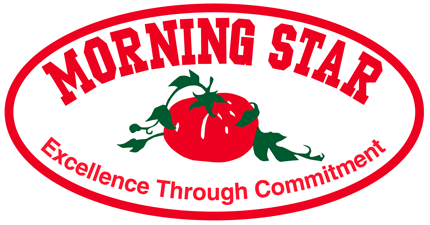
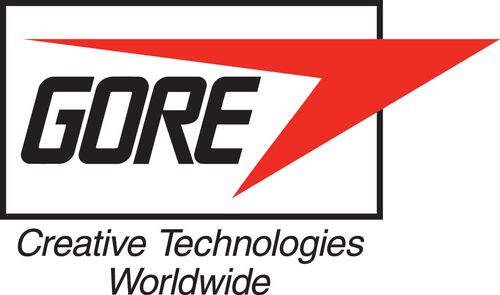
Do you have any insights to share with us about the future of consulting? And how and by whom it might be disrupted ?
I think consulting has become a little bit problematic.
Consulting assumes that experts know more about the company than the people inside it. It assumes they’ll be solving the problems for the client.
But in order to be successful, a company needs to solve its own problems and to built its own capabilities.
I also think we’re seeing a move towards decentralised consulting. There are services in the States like HourlyNerd where you can rent a former McKinsey, Boston, or Bain consultant by the hour on-line. That really disrupts the category.
But more than anything, consulting is going to be disrupted by software. It’s much easier to see a culture transform around a tool that’s catching on like Slack then it is it was around a heavy Power Point deck that was delivered to management and had to be brought to life.
Software brings behaviour changes to life in a really meaningful way. I often wonder which type of software will eat which parts of consulting. Whether you’re consulting on pricing, consumer behavior, strategy… How much of what you’re doing can be automated or turned into AI or calculation?
And even further, how much of that behavior change can be led by software rather than by people?
Taxi vs Uber: a great example of two generations of businesses fighting one another. What is your opinion about this situation? Do you have the same kind of conflict in the US?
We do. Cities have dealt with it differently…
But there is always a power structure around someone who benefits from it. Out here, the taxi company Medallion is exerting power over the taxi drivers. They are actually marginalized in New-York because of the company they work for. They are not entrepreneurs, therefore not controlling their own experience.
Uber is inevitable: it’s better for the user and it’s an optimization for the driver. It is going to happen. We probably haven’t even begun to see how that will play out.
There’s no hiding that Uber is working on self-driving cars. The real ethical dilemma comes when the hundreds of thousands Uber drivers are replaced entirely by self-driving cars.
I think a lot things in the future will be a paradox; good for the culture in one way and bad in another. We have to analyse and decide if it’s ultimately something we believe is good for us or not.
What are you optimistic and pessimistic about regarding digital transformation in the coming years? Particularly in terms of organizations and from a social viewpoint.
I’m optimistic about the human experience of work. I believe technology and new management and culture will improve the quality of work.
I’m pessimistic about a culture’s ability to change at a governement and policy level.
We run the risk of using a very old system of governement and decision-making to evaluate things that are moving very fast. We could end up in a world with many fewer jobs and less equality if we’re not careful. That’s what I’m actively trying to change with my work.
Who are you following these days? According to you, who are the people that everyone concerned by a digital transformation should listen to?
I like to watch companies that are innovating: W.L.Gore, Spotify, Holocracy... to learn from them. There are also great authors like General Stanley McChrystal who wrote Team of teams, Frédéric Laloux with Reinventing organizations.
But honestly, I spend most of my time reading about “unrelated but related” things by complexity sciencists, biologists, physicists, people that study cities or ants! Things like that really inspire me.
You were the opening keynote at USI 2015. What was the first thing that came to your mind when you came up on stage?
I was first trying to remember my French so I could introduce myself!
Second thing was basically about translation: would the concept of self-organization that I had been studying resonnates the same way in different culture? What is the appetite of the French culture to my ideas?
I also ask myself when I’m travelling if any of my jokes will make sense!
What did you think about USI? Would you like to share a memory?
I had a terrific time. When I describe it to people I say: Imagine a Ted in Paris at the Louvre. Both the people and the location were amazing. I remember having drinks on a rooftop with the sun setting on the Louvre… Quite a memory!
Do you recall a certain talk in particular?
I liked Cedric Villani’s speech. I think mathematics and algorithms have a lot to do with how organizations “eat” information and turn it into decisions…
I love watching mathematicians talk about their art form.
I also really enjoyed watching Mikko Hyppönen talk about Facebook and privacy, even if I don’t agree with him entirely.
To conclude this interview, can you tell us about your latest news?
I started a company late last year called The Ready. It’s a little bit unique because we’ve got a consulting company at the heart of it, here in NYC, that is working on self-organization and the future of work. But the twist is that we’re also opening up the brand to a network of participants around the world: people who want to have their own business but use the Ready brand and collaborate with us on a global basis.
My goal is to attract litteraly a thousand thinkers to one brand over the next couple of years. And we’re still looking for our first French member...
A lire :
- Des organisations exponentielles, analyse du talk de Salim Ismail
- L'avenir appartient aux organisations responsive, analyse du talk d'Aaron Dignan
- Interview : "Le management de demain ressemblera aux communautés Internet", Alexis Nicolas coach senior OCTO Technology
